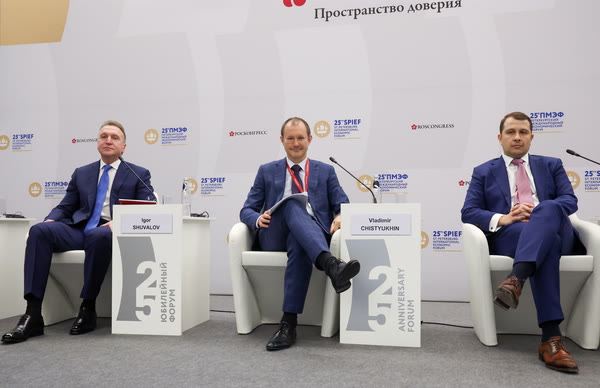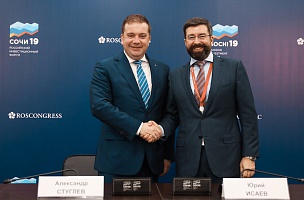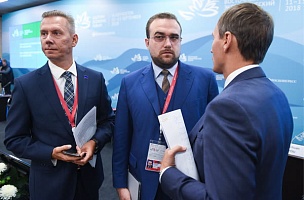Key conclusions
The Market Will Continue to Influence the Central Bank Rate
“The less the government interferes in the exchange rate, the better for the economy because it is market pricing that balances supply and demand. [...] It seems to me that all the decisions we make reflect the current reality. A combination of factors, the adjustment of the economy to the new environment, have led to the 9.5% rate we have today. If conditions change for the better with this inflation – and we definitely need low inflation for macroeconomic stability, for long-term financing and investment, for economic development – then perhaps we will have some hope of lowering the rate,” Vladimir Chistyukhin, First Deputy Governor, The Central Bank of the Russian Federation (Bank of Russia).
“We are very happy to be gradually returning to pre-crisis rates. We still believe that the key [rate] has to go down even further. We understand the current inflation that we’ve had in recent months... that it makes it possible for us to lower the key rate more aggressively. For us, the target is 5% because we have spent the whole year actually subsidising revolving credit so that there wouldn’t be any problems with credit, supply, liquidity,” Ilya Torosov, First Deputy Minister of Economic Development of the Russian Federation.
The financial system needs to be realigned to increase investment activity
“First of all, it’s obvious that we need infrastructure: payments, currency conversion, infrastructure for dealing with so-called toxic currencies and others. [...] There needs to be a recovery in the capital market – we understand that there has been a serious fall. [...] We need significant growth in the loan portfolio – at present, we have somewhere around 52 trillion [rubles], and we need to reach 75 trillion in the next three years,” Ilya Torosov, First Deputy Minister of Economic Development of the Russian Federation.
“We have started to allow concessions for the financial sector. [...] But this period – it won’t last forever, the concessions will have to end at some point, and we should already be thinking seriously about just how fast we will return, and whether the limits will be the same as before. […] Of course, for lenders and investors alike, it is fundamentally important that they see that the entity they are investing in is transparent. On the other hand, we understand that the return cannot take place too quickly because we need to ensure financial sustainability. [...] We can tighten the screws overnight, but nothing good will come of it,” Vladimir Chistyukhin, First Deputy Governor, The Central Bank of the Russian Federation (Bank of Russia).
PROBLEMS
The Market Needs a Mechanism for Lending to High-Risk projects
“We need a lot of very risky projects right now. As of today, the mechanisms that exist for higher-risk projects won’t really work... Because the programmes that have been launched so far are all oriented towards moderate, very low losses. And we need to take care of some new import substitution. [...] There definitely aren’t enough tools here to rebuild entire large industries,” Sergey Khotimskiy, First Deputy Chairman of the Management Board, Sovcombank.
“Investors themselves... with these uncertain factors – the exchange rate and the key rate and the global uncertainty – will act cautiously and avoid entering into new projects. The basic thing the market needs to know now is that the risk between the state, commercial banks, and private investors will be built on a different scale. If not, we’ll be in for a very long period of cooling-off,” Igor Shuvalov, Chairman, VEB.RF.
An Attempt by Banks to Reduce Foreign Currency Liabilities Will Impact Clients Negatively
“We are at a kind of turning point right now, when the majority of people and businesses have almost all their savings in foreign currencies – they are savings in toxic currencies, the dollar and the euro. [...] And in this respect, we have to be very careful about how we address this issue, we can’t make drastic decisions – through commissions, negative interest rates – to reduce the value of the asset for our clients. [...] Both businesses and individuals have suffered very seriously from the way the situation has changed, and to deprive them additionally of part of their assets would be an unreasonable decision. It would be wrong,” Vladimir Chistyukhin, First Deputy Governor, The Central Bank of the Russian Federation (Bank of Russia).
“We need a set of tools like this, but we can’t use it right now. Because in the light of what people have experienced with restrictions on the use of currency, to go out and say now that they have to pay for it with the value of their money – this can’t happen right now,” Igor Shuvalov, Chairman, VEB.RF.
SOLUTIONS
Financial Institutions Should Be Receiving Support Through Recapitalisation
“Although the banking system has shown a high level of resilience, it has still suffered losses. And if we want the potential for lending and the provision of other financial services to work in spite of everything, we’ll probably have to commit to some capital injections. [...] I think we could see some proposals aimed at this by autumn,” Vladimir Chistyukhin, First Deputy Governor, The Central Bank of the Russian Federation (Bank of Russia).
“We’ve already carried out some recapitalization with funds from the National Wealth Fund - DOM.RF, Gazprombank, we’ve carried out recapitalization with different instruments and VEB – in order to provide support in the current situation for the Factory (Project Finance Factory - Ed.) and lending in general. In other words, we are already moving in this direction point by point. But we’ll need to make decisions when we figure out the Central Bank’s long-term strategy on regulations in order to calculate the banking sector financial model from that,” Ilya Torosov, First Deputy Minister of Economic Development of the Russian Federation.
The Financial Market Needs Reasonable Competition to Develop
“We certainly don’t need concessions for individual players – that’s the most damaging thing that could happen because it distorts competition. [...] Of course, it’s impossible to cut off all the concessions that we have now, just like that. The approach will have to be gradual and consistent,” Sergey Khotimskiy, First Deputy Chairman of the Management Board, Sovcombank.
“Given market compression, the consolidation of the banking sector and other segments of the financial sector, it is clear that competition is coming to the fore. [...] We must take decisions that will ensure as competitive an environment as possible,” Vladimir Chistyukhin, First Deputy Governor, The Central Bank of the Russian Federation (Bank of Russia).
For more details, see the ROSCONGRESS.ORG Information and Analytical System.






